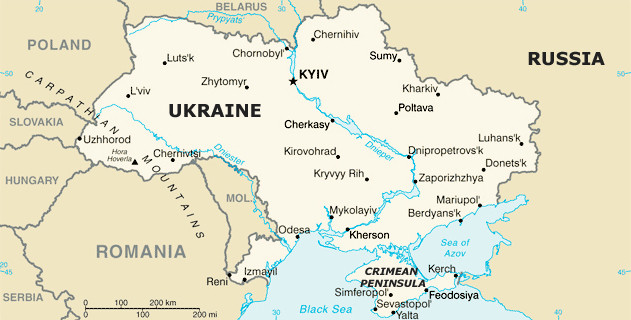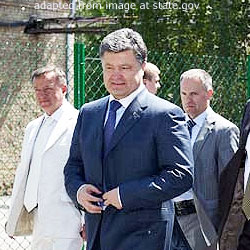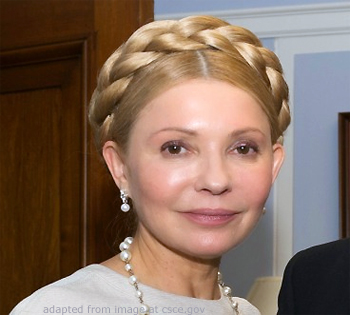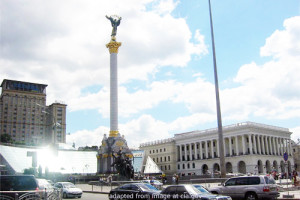How To Watch (And Understand) Ukraine’s Presidential Election

(Article text ©2019 RFE/RL, Inc., Radio Free Europe/Radio Liberty – rferl.org – Christopher Miller – KYIV – March 29, 2019 – article text also appeared at rferl.org/a/how-to-watch-(and-understand)-ukraine-presidential-election/29849578.html)
The choice is stark.
Stay the slow and not-quite-steady course with a deeply unpopular but seasoned leader who knows the ropes and has taken Ukraine westward despite foot-dragging on reforms and a failure to tackle entrenched corruption.
Go with another veteran, a political survivor with a dodgy past twice imprisoned by opponents who has lost two presidential elections but is banking on public disappointment and populist promises to carry her to victory.
Or take a chance on a comedian with no experience in politics and governing but who has managed to tap into an antiestablishment mood similar to what’s brought unconventional leaders to power in the West by appealing directly to them for answers.
 With incumbent President Petro Poroshenko, former Prime Minister Yulia Tymoshenko, and actor-turned-candidate Volodymyr Zelenskyy leading the race, this appears to be the choice before more than 35 million eligible Ukrainian voters on March 31. If no one wins the presidency outright with more than 50 percent of the vote, a runoff will be held on April 21.
With incumbent President Petro Poroshenko, former Prime Minister Yulia Tymoshenko, and actor-turned-candidate Volodymyr Zelenskyy leading the race, this appears to be the choice before more than 35 million eligible Ukrainian voters on March 31. If no one wins the presidency outright with more than 50 percent of the vote, a runoff will be held on April 21.
The Vote
Polling stations across Ukraine will open at 8 a.m. local time and close at 8 p.m. Ukrainians living abroad can vote at their embassies and consulates, except those in Russia, where Ukraine’s Foreign Ministry has told resident Ukrainians to return to Ukraine or visit a neighboring country to cast ballots.
 There will be no voting in Crimea, which was annexed and remains occupied by Russia, and a swatch of territory about the size of Maryland in the eastern provinces of Donetsk and Luhansk that has been cut off by Russia-backed separatists. Many of Ukraine’s estimated 1.5 million internally displaced persons (IDPs) are also unlikely to vote due to difficulties registering at new residences. Those who can vote will be given a paper ballot on which they must mark their presidential choice in pen before dropping it into a transparent box.
There will be no voting in Crimea, which was annexed and remains occupied by Russia, and a swatch of territory about the size of Maryland in the eastern provinces of Donetsk and Luhansk that has been cut off by Russia-backed separatists. Many of Ukraine’s estimated 1.5 million internally displaced persons (IDPs) are also unlikely to vote due to difficulties registering at new residences. Those who can vote will be given a paper ballot on which they must mark their presidential choice in pen before dropping it into a transparent box.
A record-breaking 44 candidates began the campaign, but five of them quickly dropped out. That leaves 39 names on a ballot that runs 83 centimeters (around 32 inches) long. But as things stood this week, it looked like a three-horse race.
The election is the country’s seventh since independence and second since the Euromaidan uprising ousted a Russia-friendly president in 2014 to set it on a more westward political path.
What’s On Voters’ Minds
 Those Euromaidan ideas, along with the many serious challenges facing Ukraine and which of the candidates can best help overcome them, are likely to be foremost in the minds of voters.
Those Euromaidan ideas, along with the many serious challenges facing Ukraine and which of the candidates can best help overcome them, are likely to be foremost in the minds of voters.
Whoever wins stands to inherit a country that is the poorest in Europe, with a volatile economy, a poverty rate of around 60 percent, a national average wage of just $350 a month, and endemic corruption.
They will be faced with a public that is so disillusioned with the government that just 9 percent of people have confidence in it — the lowest confidence level in the world for the second straight year, according to Gallup. The global average was 56% in 2018.
And that person will need to step into the role of Ukraine’s commander in chief, tasked with safeguarding a nation that remains engaged in a bloody war that has killed more than 13,000 people and is about to enter its sixth year. While a 2015 peace deal known as the Minsk accords brought the fighting to a simmer, it has failed to end it.
The Prince Of Comedy, The Chocolate King, And The Gas Queen
[Zelenskiy photos embedded from facebook page;
not part of original article]
Comedian and businessman Zelenskyy, who is the odds-on first-round favorite of bookies and every Ukrainian pollster, says he is up to the task. But he has been short on details. Untested politically but charismatic, he has run a clever campaign using social media that has exploited public perceptions of unrelatable, old-guard politicians and propelled him to a lead that ranges between 3 and 15 points, depending on the poll.
He shot to stardom thanks to his comedy shows aired on a TV channel owned by one of the country’s most controversial oligarchs, Ihor Kolomoyskyy, who has been the target of investigations and splits his time between Switzerland and Israel. Critics worry that the man who plays an accidental president in a hit TV show that shares the name of his political party, Servant Of The People, may be beholden to Kolomoyskyy, who to some represents the dirty politics-as-usual that Zelenskyy has railed against.
And when it comes to the war, Zelenskyy has said he would be willing to sit down and negotiate with Russia’s Vladimir Putin. Such a move is unlikely to sit well with many Ukrainians fearful of a solution that comes at Ukraine’s expense, but was received favorably by Russian state TV news shows seen as telegraphing discussions inside the Kremlin.
Ukrainians wary of putting a novice with murky connections and an open mind about Moscow in the presidency are likely to tick their ballots for Poroshenko, a billionaire chocolate-factory owner who has steered the country westward, albeit not in the straightest of lines.
They may well be mindful of the fact that Poroshenko has rebuilt Ukraine’s military into an impressive fighting force able to stop the advance of Russia-backed forces fighting in the country’s east; that his administration has secured visa-free travel to the European Union; that he has helped create a new, independent Orthodox Church of Ukraine; that he has raised the profile of the Ukrainian language; that he has stabilized the country’s economy; and that on his watch its gross domestic product (GDP) grew by 3.3 percent last year, the highest level since 2011.
Still, he has experienced some ups and downs in his campaign. Recently, he’s been plagued by accusations of vote buying and other dirty tricks involving administrative resources that polls suggest have hampered his popularity.
Some of the strongest allegations have come from rival Tymoshenko, dubbed by some the “gas princess” for her rise to prominence as an energy tycoon, who is hoping a third presidential run will be the charm.
Once the face of 2004’s pro-democracy Orange Revolution, her current campaign has also been accused of vote-buying schemes and trying to pay off a rival candidate with a name almost identical to hers to drop out of the race.
Comments Tymoshenko made about the U.S.-born health minister coming to Ukraine to “experiment on Ukrainians” has also not helped her. And her past dealings with Putin continue to haunt her, though she claims her experience in dealing with him may be useful in ending the war in eastern Ukraine.
Still, her campaign promises — slashing gas prices in half and raising pensions threefold — are popular among much of Ukraine’s older population.
Poroshenko The ‘Nationalist’ Vs. The Nationalists
Unlike in neighboring Russia, where elections are all but predetermined, Ukraine has managed to introduce a tradition of free and fair elections (with the fraudulent 2004 vote that led to the Orange Revolution being a notable exception).
This time around, though, concerns have mounted over the scale of dirty politicking and fraud allegations, as well as over a disturbing threat — violent nationalists.
A growing nationalism has washed over Ukraine since the Euromaidan uprising and the eruption of the war in the east. In an attempt to capitalize on it, Poroshenko’s campaign adopted the catchphrase “army, language, faith.”
But a recent corruption scandal involving military procurements that ensnared one of Poroshenko’s close allies has tarnished that slogan and sparked protests by far-right nationalists from the Azov National Corps and its National Militia vigilante unit.
Despite Poroshenko’s and his government’s previous support for such nationalist groups in the war in the east, they have turned on him in the wake of the scandal, marching on his administration with pink, stuffed pigs that they hurled with a giant slingshot toward his administration to symbolize his alleged support for profiteers. In western Ivano-Frankivsk and the central cities of Cherkasy and Vinnytsia, they have clashed with police in an attempt to confront the president during campaign rallies.
In doing so, the far right has cast a shadow over the elections that has darkened since its members threatened to use violence to stop anyone they claim to be violating election rules.
Last week, RFE/RL obtained a letter from ambassadors of the Group of Seven leading industrialized countries to Ukraine’s Interior Ministry voicing concern about the threat to the elections posed by those groups. Over the past year, far-right extremists have carried out attacks targeting LGBT and women’s rights activists and Romany communities around the country.
Those and other, similar warnings may have fallen on deaf ears. Scores of members of the unruly Azov group will monitor the presidential balloting, thanks to approval from the Central Election Commission that cannot legally be revoked.

